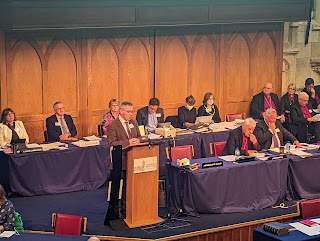Archbishop calls for a mission audit. How does the church itself measure up?
The Archbishop of Armagh has challenged us to do an ‘audit’ against the Five Marks of Mission, but how does the Church of Ireland measure up?
I was very pleased to read that the Archbishop’s presidential address at Armagh Diocesan Synod was about the Five Marks of Mission. They are an important statement on person evangelism – for they came out of an Anglican Consultative Council on personal evangelism in 1984 – and they demonstrate that holistic, integrated missions is key in the Anglican Communion.
The Five Marks of Mission are:
The Five Marks of Mission are:
- To proclaim the Good News of the Kingdom
- To teach, baptise and nurture new believers
- To respond to human need by loving service
- To transform unjust structures of society, to challenge violence of every kind and pursue peace and reconciliation
- To strive to safeguard the integrity of creation.
His speech took a more pointed tone when speaking about the third and forth marks of mission. He said to care about the needs of others and do all in our power to speak and act against injustice are not optional extras.
“They are precisely what our Lord was talking about in Matthew 25 with his parable of the separation at the judgement between those who cared about the suffering of others and those who did not.”
He highlighted society's support of unjust regimes, arms sales, slave labour, and refusing refugees as key issues.
On the fifth mark of mission I was very pleased to hear Archbishop say this,
On the fifth mark of mission I was very pleased to hear Archbishop say this,
“Care of the creation and our responsibility for it was something that became very real to me in Lusaka, where I heard of formerly inhabited islands in the dioceses of the southern Pacific that have disappeared beneath the ocean because of global warming.”
He encourages parishioners to act in simple ways for future and present generations.
But how does the Church of Ireland itself measure up to his call for an audit? How should it act in regards to climate justice and global warming? The Bishops' Appeal does and excellent job but it is where the church's money is invested that raises questions.
But how does the Church of Ireland itself measure up to his call for an audit? How should it act in regards to climate justice and global warming? The Bishops' Appeal does and excellent job but it is where the church's money is invested that raises questions.
Currently the Church of Ireland has millions of pounds invested in the fossil fuel industry – directly contributing to carbon pollution that causes global warming. Yesterday the UN Food and Agriculture released a report saying climate change could tip up to 122 million people into poverty by 2035. The report said,
"Climate change is already affecting agriculture and food security. Without urgent action, millions more people will be at risk of hunger and poverty."
How can the church give aid to those who are suffering from climate change, but invest in an industry that contributes to the cause of the problem?
The Church of Ireland does not invest in arms sales, or tobacco companies, but it is still content to reap the profits from fossil fuels - an industry that, according to the World Health Organisation, is as bad as tobacco smoking. Is this ethical?
The call for an audit of the 5 Marks of Mission is welcome. I hope we will see progress on climate justice and unethical investments from the Church of Ireland itself.
.JPG)


Comments